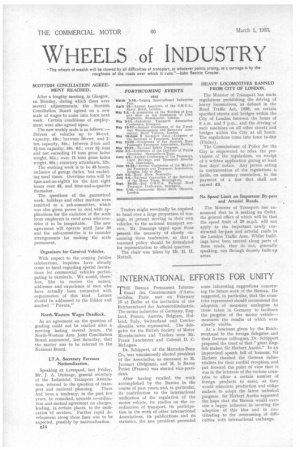WHEELS of INDUSTRY "The wheels of wealth will be slowed
Page 28

If you've noticed an error in this article please click here to report it so we can fix it.
by all difficulties of transport, at whatever points arising, as a carriage is by the roughness of the roads over which it runs."—John Beattie Crozier.
SCOTTISH CONCILIATION AGREEMENT REACHED.
After a lengthy meeting, in Glasgow, on Monday, during which there were several adjournments, the Scottish Conciliation Board agreed on a new scale of wages to come into force next week. Certain conditions of employment were also agreed upon.
The new weekly scale is as follows:— Drivers of vehicles up to 30-cwt. capacity, 49s.; between 30-cwt. and 2ton capacity, 54s.; between 2-ton and 3f-ton capacity, 58s. 6d.; over 31 tons and not exceeding 12 tons gross laden weight, 61s.; over 12 tons gross laden weight, 66s.; statutory attendants, 52s.
The working week is to be 48 hours, inclusive of garage duties, but excluding meal times. Overtime rates will be time-and-an-eighth for the first eight hours over 48, and time-and-a-quarter thereafter.
The questions of the guaranteed week, holidays and other matters were remitted to a sub-committee, which was also given power to deal with applications for the variation of the scale from employers in rural areas who consider it to be inequitable. The new agreement will operate until June 30 and the sub-committee is to consider arrangements for making the scale permanent.
Organizers for Carnival Vehicles.
With respect to the coming jubilee celebrations, inquiries have already come to hand regarding special decorations for commercial vehicles participating in carnivals. We would, there2 fore, like to receive the names: addresses and experience of men who have actually been connected with organization of this kind. Letters should be addressed to the Editor and marked "Private."
North-Western Wages Deadlock.
As an agreement on the question of grading could not be reached after a meeting lasting several hours, the North-Western Area Joint Conciliation Board announced, last Saturday, that the matter was to be referred to the National Board.
I.T.A. Secretary Foresees Nationalization.
Speaking at Liverpool, last Friday, Mr. J. A. Dunnage, general secretary of the Industrial Transport Association, referred to the question of trans port and national planning. There had been a tendency, in the past few years, he remarked, towards co-ordination and mutual agreement on charges, leading, in certain places, to the unification of services. Further rapid development along these lines was to be expected, possibly by nationalization.
B14 Traders might eventually be required to hand over a large proportion of tonnage, at present moving in their own vehicles, to the national transport service. Mr. Dunnage urged upon those present the necessity of closely examining these tendeficies, so that a reasoned policy should be formulated for representation to official quarters.
The chair was taken by Mr. H. H. Nuttall. HEAVY LOCOMOTIVES BANNED FROM CITY OF LONDON.
The Minister of Transport has made regulations prohibiting the driving of heavy locomotives, as defined in the Road Traffic Act, 1930, on certain specified streets and bridges within the City of London between the hours of 9 a.m. and 7 p.m., and the driving of such machines on all other streets and bridges within the City at all hours. The regulations come into force to-day (Friday).
The Commissioner of Police for the City is empowered to relax the provisions of the regulations, on receipt of a written application giving at least four days' notice. Any person acting in contravention of the regulations is liable, on summary conviction, to the payment of a fine that shall not exceed £5.
No Speed Limit on Important By-pass and Arterial Roads.
The Minister of Transport has announced that he is making an Order, the general effect of which will be that the speed limit of 30 m.p.h. will not apply to the important newly constructed by-pass and arterial roads in the London Traffic Area. Whilst buildings have been erected along parts of these roads, they do not, generally speaking, run through densely built-up areas.




























































































